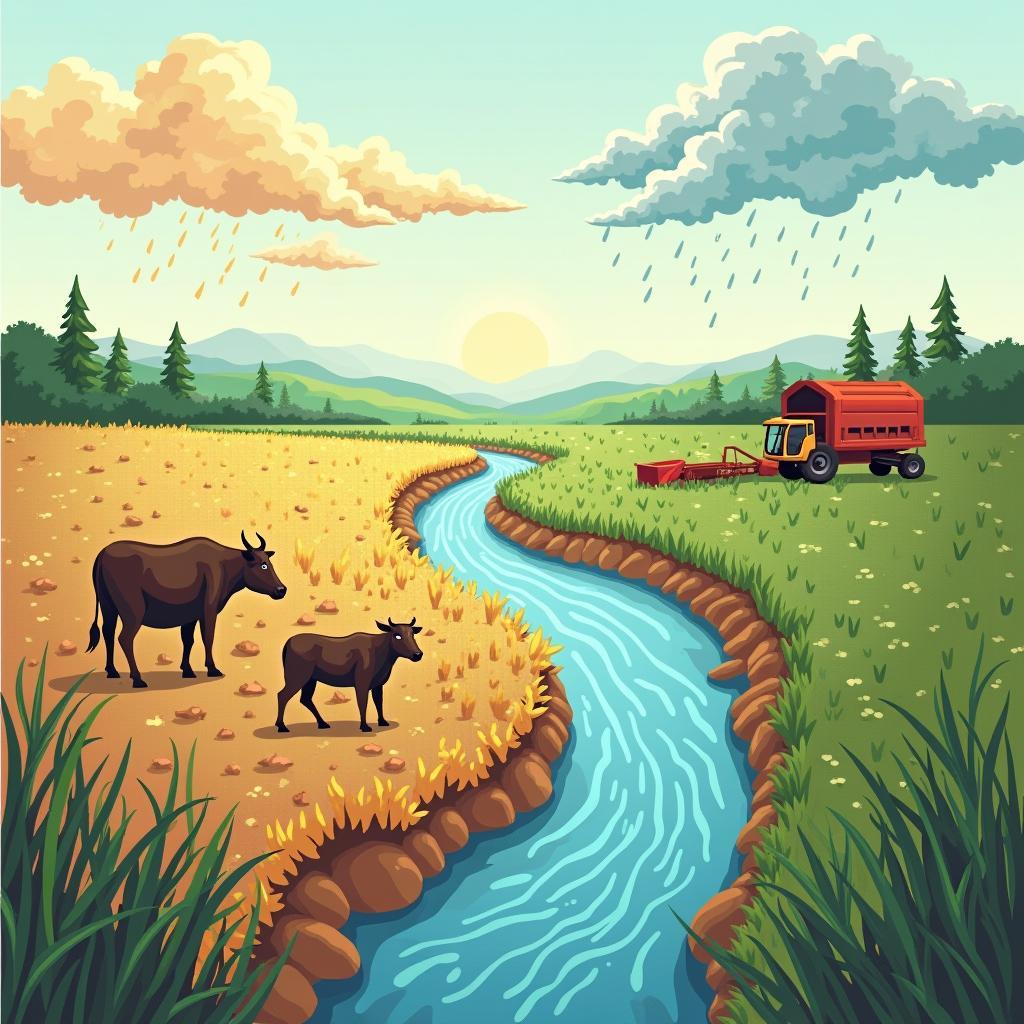The IELTS Reading test can be challenging, often including passages rich with data and analysis. One frequently discussed topic is how climate change impacts global agricultural productivity. Given the relevance and urgency of this subject, there’s a high probability you might encounter it in your IELTS test. In this article, we’ll delve into this topic through a sample IELTS Reading passage, practice questions, and detailed answers to aid your preparation.
Full Sample IELTS Reading Passage: Medium Text
Climate Change and Global Agriculture Productivity
Climate change is increasingly becoming a prominent issue affecting various sectors, notably agriculture. Agricultural productivity relies heavily on climatic conditions, and even minor changes in temperature and precipitation can significantly impact crop yields and livestock health. This article explores how climate change is affecting global agriculture and what it means for future food security.
Temperature Variability:
One of the primary ways climate change affects agriculture is through temperature variability. Crops such as wheat, rice, and maize are sensitive to temperature changes. Increased temperatures can accelerate growth rates but often at the cost of yield quality and volume. For instance, a study by the International Food Policy Research Institute (IFPRI) found that every one-degree Celsius rise in temperature could potentially decrease wheat yields by 6%.
Precipitation Changes:
Climate change also disrupts precipitation patterns, leading to either droughts or floods. Both extremes adversely affect crop productivity. Prolonged periods of drought lead to soil degradation and reduced water availability, essential for agricultural activities. On the contrary, excessive rainfall can cause flooding, damaging crops and reducing the fertility of the soil due to nutrient runoff.

Extreme Weather Events:
Apart from temperature and precipitation, the frequency and intensity of extreme weather events, such as hurricanes, tornadoes, and hailstorms, have also increased. These events can decimate entire harvests in a short period, rendering agricultural planning and risk management incredibly challenging.
Impact on Livestock:
It’s not just crops that are affected; livestock production is also increasingly vulnerable. Heat stress in animals can lead to decreased fertility, lower milk production, and higher mortality rates. Changes in grass and water availability also affect grazing patterns and the overall health of livestock.
Adaptation and Mitigation:
Farmers worldwide are adopting various strategies to cope with climate-induced challenges. These include shifting planting dates, changing crop varieties to more drought-resistant strains, and investing in modern irrigation systems. Additionally, there is a growing emphasis on sustainable farming practices to reduce greenhouse gas emissions from agricultural activities.
Given these changes, the agricultural sector must adapt quickly to maintain productivity levels and ensure global food security. This will involve not just changes at the farm level but also international policies aimed at reducing the global carbon footprint and mitigating the impacts of climate change.
Sample IELTS Reading Questions
Multiple Choice
- According to the International Food Policy Research Institute (IFPRI), how much can wheat yields decrease with a one-degree Celsius rise in temperature?
- A) 2%
- B) 4%
- C) 6%
- D) 8%
- What is one of the primary ways climate change affects agriculture?
- A) Soil erosion
- B) Temperature variability
- C) Market prices
- D) Pest invasion
True/False/Not Given
- Floods never contribute to soil nutrient runoff.
- A) True
- B) False
- C) Not Given
- Livestock production is more resistant to climate change than crop production.
- A) True
- B) False
- C) Not Given
Matching Headings
- Match the following sections from the reading passage with the correct headings.
- Section 1: Temperature Variability
- Section 2: Precipitation Changes
- Section 3: Extreme Weather Events
- Section 4: Adaptation and Mitigation
Sentence Completion
- Prolonged periods of drought lead to ____ and reduced water availability.
- Farmers are shifting planting dates and changing crop varieties to ____.
Answers and Explanations
- C) 6% – Based on the passage, “every one-degree Celsius rise in temperature could potentially decrease wheat yields by 6%.”
- B) Temperature variability – “One of the primary ways climate change affects agriculture is through temperature variability.”
- B) False – The passage states that “excessive rainfall can cause flooding, damaging crops and reducing the fertility of the soil due to nutrient runoff.”
- C) Not Given – The passage describes the vulnerabilities of livestock production but does not compare it directly to crop production in terms of resistance.
-
- Section 1: “Temperature Variability”
- Section 2: “Precipitation Changes”
- Section 3: “Extreme Weather Events”
- Section 4: “Adaptation and Mitigation”
- soil degradation
- more drought-resistant strains
Common Mistakes to Avoid
- Overlooking Key Details: Often, students miss out on essential details like specific statistics or cause-effect relationships.
- Misinterpreting Data: Understanding graphs, tables, and figures correctly is crucial for accurate answers.
- Rushing Through Questions: Allocate time wisely to ensure all questions are approached with clear understanding.
Vocabulary for the Passage
- Precipitation /ˌprɪsɪpɪˈteɪʃ(ə)n/ (noun): any form of water – liquid or solid – falling from the sky.
- Degradation /ˌdɛɡrəˈdeɪʃ(ə)n/ (noun): the condition or process of degrading or being degraded.
- Mitigation /ˌmɪtɪˈɡeɪʃn/ (noun): the action of reducing the severity, seriousness, or painfulness of something.
- Fertility /fəˈtɪlɪti/ (noun): the quality of being fertile; productiveness.
Grammar Focus
Conditional Sentences: Used for describing situations that depend on a specific condition.
- Example: “If temperatures rise by one degree Celsius, wheat yields could decrease by 6%.”
- Structure: If + present simple, + future simple
Tips for High Reading Scores
- Practice Regularly: Reading various topics helps you get accustomed to different vocabularies and writing styles.
- Enhance Vocabulary: Knowing a broad range of words helps you understand and interpret questions more effectively.
- Timed Practice Sessions: Simulate exam conditions to manage time efficiently.
By focusing on these strategies, you can optimize your IELTS Reading preparation, especially concerning current and impactful topics like climate change and agriculture productivity. For further reading, you may visit IELTS.NET – How is Climate Change Affecting Agricultural Productivity?.